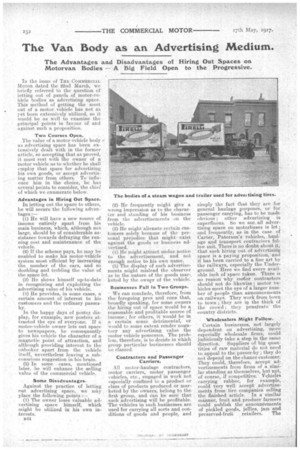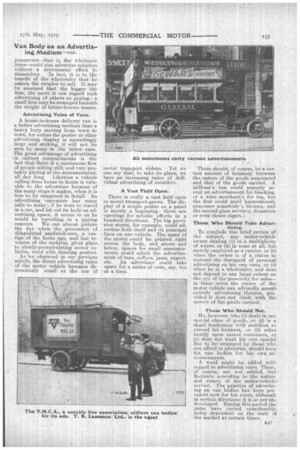The Van Body as an Advertising Medium.
Page 12

Page 13

If you've noticed an error in this article please click here to report it so we can fix it.
The Advantages and Disadvantages of Hiring Out Spaces on Motorvan Bodies -A Big Field Open to the Progressive.
In the issue of THE COMMERCIAL Moron. dated the 22nd March, we briefly referred to the question of letting out of panels of motor-vehicle bodies as advertising space. This method of getting the most out of a motor vehicle has not as yet been extensively utilized, so it would be as well to examine the principal points in favour of and against such a proposition.
Two Courses Open.
The value of a motor-vehicle body as advertising space has been extensively dealt with in the former article' so *accepting that as proved, it must rest with the owner of a motor vehicle as to whether he shall employ that space for advertising his own goods, or accept advertising matter from others. To influence him in the choice, he han several points to consider, the chief of which we enumerate below.
Advantages in Hiring Out Space. In letting out the space to others, he will secure the following advantages :— (I) He will have a new source of income entirely apart from his main business, which, although not large, should be of considerable assistance towards defraying the running cost and maintenance of the vehicle.
(2) If the scheme pays, he may be enabled to make his motor-vehicle system most 'efficient by increasing the number of the cars, and so doubling and trebling the value of the space let.
(3) He shows himself up-to-date in recognizing aid .exploiting the advertising value of his vehicle. (4) He provides in some cases, a certain amount Of interest to his customers and the ordinary passelby.
In the happy days of poster display, for example, new posters attracted the eye of everyone. If a motor-vehicle owner lets out space to newspapers, he consequently gives his vehicle the character of a magnetic point of attraction, and although providing interest to the onlooker apart from the vehicle itself, nevertheless leaving a subconscious suggestion in -his brain. (5) In some cases, mentioned later, he will enhance the -selling value of the commercial vehicle.
Some Disadvantages.
Against the practice of letting out advertising space, we intay place the following points : (I) The owner loses valuable advertising space himself, which might be utilized in his own interests.
(2)• He frequently might give a wrong Impression as to the character and . standing of his business from the advertisements on the vehicle.
(3) He might alienate certain customers solely because of the personal prejudice that might exist against the goods or business advertised.
(4) He might attract undue notice to the advertisement, and not enough notice to his own name.
(5) The display of such advertisements might mislead the observer , as to the nature of the goods mar-_. keted by the owner of the vehicle.
Businesses Fall in Two Groups.
• We can conclude, therefore, from the foregoing pros and cons that, broadly speaking, for some owners the hiring out of space would be a reasonable and profitable source of income ; for others, it' would be in
. certain sense detrimental; or would to some extent render nugatory any advertising value the motor vehicle possesses. The problem, therefore, Is to decide in which group particular businesses should be classed.
Contractors and Passenger Carriers.
All motor-haulage contractors, motor carriers, motor passenger vehicles, etc., engaged in work not especially confined to a product or class of products produced or marketed by the owners, belong to the first group, and can be sure that such advertising will be profitable. The vehicles in such businesses are used for carrying all sorts and conditions of goods and people, and
simply the fact that they are for general haulage purposes, or for passenger car.rying, has to be made obvious ; other advertising is superfluous. So we see. all advertising space on motorbuses is let ; and frequently, as in the -case of Carter, Paterson's vehicles, haulage and transport contractors follow suit. There is no doubt about it, that such hiring out of advertising space is a paying proposition, and it has 'been carried to a fine art by the railways, especially the Underground. Here we find every available inch of space taken. There is no reason why mcifor contractors should not do likewise ; motor vehicles meet the eye of a larger nuniber of people than announcements on railways. They work from town to town ;% they are in the thick of the crowd ; they penetrate the country districts.
Wholesalers Might Follow.
Certain businesses, not largely dependent on advertising, more especially wholesale firms, could judiciously take a step in the same direction. Suppliers of big quantities of raw material do not need to appeal to the passer-by ; they do riot depend on the chance customer.. They could, therefore, accept ad: vertisements from firms of a similar standing as themselves, but not, of course,. if competitive. Vehicles carrying rubber, for example,' could very well accerit advertisements from tire companies selling the finished article. In a similar manner, fruit and produce farmers could publish the announdenients of pickled goods, jellies, jam and preserved-fruit retailers. The
preservers—that is, the wholesale firms—could also advertise retailers without a detrimental effect to themselves. In fact, it is to the benefit of the wholesaler that he assists the retailer to sell. It may be assumed that the bigger the firm, the more it can regard such advertising of others as paying ; a small firm may be swamped beneath the weight of better-known names..
Advertising Value of Vans.
A house-to-house delivery van is a better advertising medium than a heavy lorry moving from town to town, for unless the poster or other advertising display is exceedingly large and striking, it will not be seen by many in the latter case. The great advantage of advertising .in railway compartments is the fact that there is a continuous flow of people sitting still, and very probably glaring at the announcement, all day long. Likewise a vehicle calling from house to house is valuable to the advertiser because of the many stops it makes, when it is
• free to be examined in detail. Art advertising canvasser has many calls to make ; if he were to travel in a car, and let out its body as advertising space, it seems to us he would be travelling in a paying concern. We can almost picture the day when the procession of dilapidated sandwich-Men, a vestige of the horse age, and last resource of the reckless, gives place to slowly-perambulating motor vehicles, vivid with dazzling posters. As 'We observed in our previous article, the direct advertising value of the motor vehicle becomes decreasingly small as the use of motor transport widens. Yet we can say that, to take its place, we have an increasing value of individual advertising of outsiders.
A Vast Field Open.
There is really a vast field open as motor transport grows. The display of a simple poster on a panel is merely a beginning: there are openings for artistic efforts in a hundred directions.. The big Provision stores, for example, could advertise both itself and its principal lines on one vehicle. The name of the stores could be printed right across the body, and above and below, spaces for small announcements could admit. the advertisement of teas, coffees, jams, sugars, etc. An advertiser could take space for a series of vans, say, ten at a time. There should, of course, be a—certain amount of harmony between the nature of the goods announced and that of the goods carried. A milliner's van could scarcely accept an advertisement for blacking, or a wine merchant's for tea, but the first could quite harmoniously announce somebody's blouses, and the second glass services, decanters or even choice cigars.
Those Who Should Take Advertising.
To conclude this brief review of the subject, any motor-vehicle owner dealing (1) in a multiplicity of wares, or (2) in none at all, but merely employed as a carrier, or (3) when the owner is of a status to warrant the disregard of personal advertising on his own vans, or (4) when he is a wholesaler, and does not depend to any large extent on the eye of the-passer-by for sales— in these cases the owner of the motor vehicle can advisedly accept outside advertising thereon, provided it does not clash with the nature of the goods carried.
-Those Who Should Not.
He, however, who (1) deals in one special class of goods, or (2) is a small tradesman with ambition to _ extend his business, or (3) relies mostly upon casual customers, or (4) does net want his own special line to be swamped by those who .
can afford to advertise.' should keep his van bodies for his own annmin cements.
A word might be added with regard to advertising rates. These, of course, are not settled, hut fluctuate according to the nature and exte.ot of the motor-vehicle service. The practice of advertising on van bodies has been prevalent now for ton years, although in certain directions it is as yet'undeveloped. During this period the rates have varied considerably. being dependent on the state of the market at certain times.






















